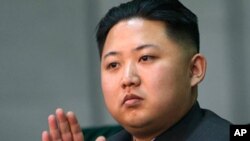The death of longtime North Korean leader Kim Jong Il and promotion of his untested son Kim Jong Un as his successor is fueling uncertainty about the secretive and impoverished state. Our reporter looks at how North Korea's leadership transition may unfold and how that process may affect Pyongyang's domestic reforms and relations with regional powers.
Kim Jong Un may be North Korea's next leader, but his influence within the North Korean leadership is not clear.
His late father Kim Jong Il appointed him to several top posts, including four-star general, only last year.
Watch a related report by Laurel Bowman:
North Korean analyst Benjamin Habib of Australia's LaTrobe University says Kim Jong Un did not have much time to earn the trust of power brokers in the military and the ruling Korean Workers' Party.
"Does he have enough support among key figures so that this succession will run smoothly? If we recall, Kim Jong Il had 20 years' apprenticeship to solidify his patronage networks prior to his assumption of the throne in 1994," said Habib. "So there is a big question mark over how smoothly his succession is going to run."
Two prominent figures whose support would boost Kim Jong Un are his father's sister Kim Kong-Hui and her powerful husband, Jang Song-Thaek.
Jang expanded his influence as a key adviser to Kim Jong Il after the elder Kim suffered an apparent stroke in 2008.
Some experts say the older relatives of Kim Jong Un may see him as too young and inexperienced to take the seat of power, at least initially.
"An alternative might be that Kim Jong Un becomes a figurehead leader for a military dictatorship, something like collective military leadership that you would see in Myanmar [Burma], or it could be that Kim Jong Un is discarded completely in favor of a military dictatorship," said Habib.
John Swensen-Wright is a Korean politics expert at Chatham House in London. He believes the North Korean military is unlikely to stage a coup against the younger Kim for the time being.
"I think we are going to see an attempt to consolidate power and to provide reassurance to the North Korean people and most importantly to introduce and legitimize Kim Jong Un in the minds and hearts of ordinary North Koreans. That will take time," said Swensen-Wright.
As North Korea's transition process unfolds, another uncertainty is the fate of tentative economic reforms in the isolated communist state.
In recent years, young North Korean policy makers of Kim Jong Un's generation have boosted foreign investment from China. They also have opened their country to limited mobile phone and Internet services.
Habib says a key question facing North Korea's next leadership is whether to further open up an economy that has struggled to feed its people since the 1990s.
"If yes, that means that the international community has an opportunity to deal with this new government," he said. "If no, and we know that the system is inherently unstable, then that opens the door to possible state failure and systemic collapse."
North Korea's neighbors have long feared that chaos in that nation could send millions of North Koreans flooding across their borders. Tens of thousands of North Koreans already have crossed into China in recent years in search of food.
LaTrobe University analyst Habib says the risk of North Korea becoming a failed state will make regional powers more determined to resume six-party talks with Pyongyang as a way of managing any crisis.
North Korea withdrew from the talks in 2009. They were aimed at persuading Pyongyang to dismantle its nuclear weapons program in return for diplomatic and economic incentives.
Some experts say North Korea's sudden power transition also raises the risk that Pyongyang may take military action against its neighbors in a bid to rally North Koreans around their new leaders.
North Korean forces shelled a South Korean border island last year, an action Pyongyang credited to Kim Jong Un.
But Swensen-Wright of Chatham House says he expects North Korea to pursue a more pragmatic approach to regional relations.
"It is not a country that I think is prone to intentionally provoke or intentionally seek to destabilize the region. It wants to pursue its national interests, whether that is enhancing its security, or improving access to economic resources, or strengthening its diplomatic ties with its neighbors," he said.
Regional politics could become even more complicated next year, when South Korea holds a presidential election and goes through its own leadership transition.




